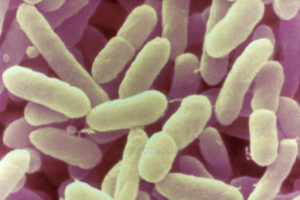As we saw with the recent large scale recalls of infant formula, Cronobacter has become a pathogen of growing public health concern for vulnerable populations. Our guest experts, Sally Powell Price, Regulatory Expert Food and Beverage Safety at MilliporeSigma, and Andrew Lienau, Food Regulatory and Validation Senior Expert at MilliporeSigma, detail the importance of Cronobacter in food manufacturing, summarize detection solutions and provide a glimpse into the future of this potentially deadly pathogen.
Why is Cronobacter detection important?
Cronobacter are ubiquitous pathogens that have been isolated from a wide variety of sources including dried herbs and spices, soil, starches and milk products. They are found naturally in the environment, for example, in our yards, kitchens and living rooms. They even can live on surfaces including kitchen counters, sinks and food facility manufacturing equipment.

Infant formula, as we have seen in recent years, can be contaminated by this type of bacteria. While Cronobacter infections are rare, they can be fatal to newborns and immunocompromised individuals. When these infections are diagnosed in infants, they are often linked to consumption of powdered formula.
According to CDC, the potential mortality rate for Cronobacter infection is 40%. It has high risks for newborns, especially low-birth weight infants. Cronobacter is highly resistant to stress and can survive in products such as powdered infant formula for more than two years, which is the major risk factor. Almost all Cronobacter species are linked to human infections (adults and infants).
How is MilliporeSigma’s Assurance® GDS method fit-for-purpose for detection of Cronobacter?
Ensuring an assay is robust is a lengthy process. Microbiology methods are reviewed and approved by standards or certification bodies. Certification organizations for food microbiology include AOAC International and Health Canada in North America and AFNOR Groupe and MicroVal in Europe. Approved testing methods undergo rigorous, systematic scientific scrutiny and validation to ensure they are credible and legally defensible and thus can be used with confidence by industry, regulatory agencies, research organizations, testing laboratories and academic institutions. It is important during this validation process to demonstrate that the methods are reproducible and provide consistent results across a variety of sites and users.

During the certification process, methods are compared against standard reference methods or a “gold standard.” For example, there is a reference method developed by ISO for enrichment of Cronobacter from foods. Through the certification process, the MilliporeSigma Assurance® GDS method performed as well as the reference method. But the GDS Cronobacter method requires less time, materials and personnel to obtain comparable results. This certification improves both industry confidence and access to a rapid, reliable method for detection of Cronobacter in food.
The GDS for Cronobacter method has been reviewed and approved by both MicroVal (MicroVal 2017LR77) and AOAC International (AOAC PTM 121903; AOAC OMA 2021.08). These review processes can take more than one year from initial submission of protocol to generation of the validation data, including final review of the results by the certification organization. Outside expert peers also review the method for approval.
This year MilliporeSigma was honored that the Assurance® GDS Cronobacter method was recognized as the Method of the Year Award in Microbiology by AOAC International.
What are the regulatory implications and outlook for Cronobacter & infant formula?
The recent move towards restructuring the FDA and Human Foods Program was in part driven by the high-profile recalls and subsequent infant formula shortages due to Cronobacter contamination. Over the next year, we can expect to see continued regulatory scrutiny of Cronobacter and similar pathogens or analytes that put infants and other vulnerable populations at risk.

Last year, the U.S. FDA released a strategy to help prevent Cronobacter illnesses, and in 2023, they expanded their approach by increasing inspection capacity and updating the Infant Formula Compliance program.
Beginning in 2024, Cronobacter infection will be a nationally notifiable disease as recognized by the US Centers for Disease Control (CDC). The FDA will collaborate with states and public health labs to bolster testing efforts. This will provide more clinical isolates, complementing the FDA’s environmental and product sample collection and sequencing strategies. It will also increase sequencing data available in the NCBI database in hopes of bridging scientific gaps related to Cronobacter.
Furthermore, the FDA is reviewing existing testing criteria to potentially enhance finished product safety with a focus on infant formula regulations led by the Office of Critical Foods. The Agency is collaborating with Congress to explore legal avenues to require firms to report Cronobacter-positive product test results, among other requirements.
For infant formula manufacturers it’s not all about regulation, however. Manufacturers and stakeholders now have expanded opportunities for collaboration with the FDA and related working groups like the National Advisory Committee on Microbiological Criteria for Foods (NACMCF). These partnerships offer a unique chance for productive dialogue and the potential to engage in valuable initiatives aimed at providing scientific insights into Cronobacter and its prevention, including elective surveillance programs. Additionally, stakeholders in the infant formula industry can strengthen efforts to be transparent with consumers. They may actively participate in public meetings and engage with industry associations such as the Association of Food and Drug Officials (AFDO) or The Partnership for Food Safety Education (PFSE), fostering open discussions and sharing best practices to enhance safety and quality standards in the production and preparation of powdered infant formula. This proactive engagement not only fosters consumer confidence but also contributes to a safer environment for infants and vulnerable populations.
Resources:
https://www.sigmaaldrich.com/US/en/product/sial/71038bc
https://www.youtube.com/watch?v=JyANKbGPeJQ






